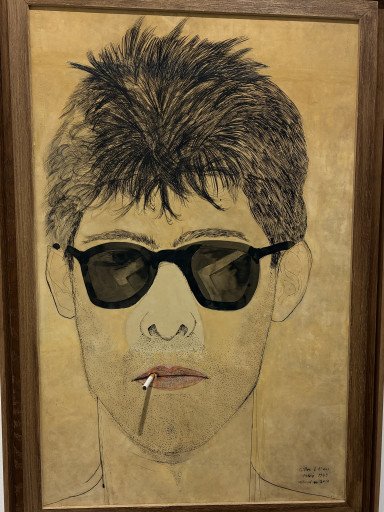

Stephan
Zilkens
,
Zilkens’ News Blog 18 2025
What would art be without those who create it? We think we know a lot about the great artists of each era, but often little or nothing about the lesser-known creators. Sometimes websites are maintained and, depending on the mood, updated. But most artists of all kinds lead lives unnoticed by the public, hoping to supplement their income through art lessons. The Kunstfonds foundation now wants to shed light on this and hopes that as many people as possible will fill out a questionnaire that can shed light on the darkness of recent years. Artists who read our news blog can fill out the questionnaire directly here. But please hurry. The registration period ends on 30 April. And if you find this too inconvenient due to data protection or other reasons, don't complain about not being considered.
Museums strengthen democracy is the motto of this year's annual conference of the German Museum Association next week in Chemnitz – in the heart of AfD territory. Whether this is true or whether museums can also be used or blackmailed to achieve the opposite is an exciting question. The more state-run a museum is, the greater the danger that it will only represent the official line. Germany has painful experience of this from the time when many works were removed from museums as degenerate. And please don't think that we are immune to this today. America is currently demonstrating this. Only privately funded institutions have sufficient resistance so far.
What a papal funeral can achieve: on the sidelines, Trump, the president of what was once the most powerful country in the Western hemisphere, dressed in dove blue, meets the president of Ukraine, a country ravaged by Russia, dressed in black, for a chat in late Renaissance rooms, and already the former seems inclined to take a more critical view of Putin. Let's hope this lasts, so that we can still maintain our faith in justice in the world.
In Switzerland, the art-loving Helvetia, which has already swallowed up Nationale Suisse, also well versed in art insurance, is merging with Basler Versicherung, which has probably gained little from its conversion to a French name. Baloise and Helvetia are merging to form one of Switzerland's largest insurance groups. This will have an impact on locations in Europe where both companies are present. And beyond that, one has to ask whether the capacities that the companies make available for art insurance will be maintained in the long term. 1+1 rarely equals 2.5 in the insurance industry – more like 1.3, as many mergers in recent years have shown. Competition will be lost and for some customer groups, the willingness to offer individual solutions will decline. For a while, brokers and underwriters will be able to compensate for this if they are prepared to take on tasks from the companies.
Robert Read, one of Hiscox's leading underwriters in London, has criticised the influence of Trump's policies on the American art market in an interview with the insurance industry. Let's see who moves to Miami in December. Art Brussels came to an end yesterday in Brussels, presenting a solid offering – only the million-dollar paintings in the sensational category were few and far between. More on this from Stefan Kobel.
We wish you all a strong week, which may be the last with a functioning government in Germany for the foreseeable future.
Yours, Stephan Zilkens and the team at Zilkens Fine Art Insurance Broker GmbH in Solothurn and Cologne
automatically translated